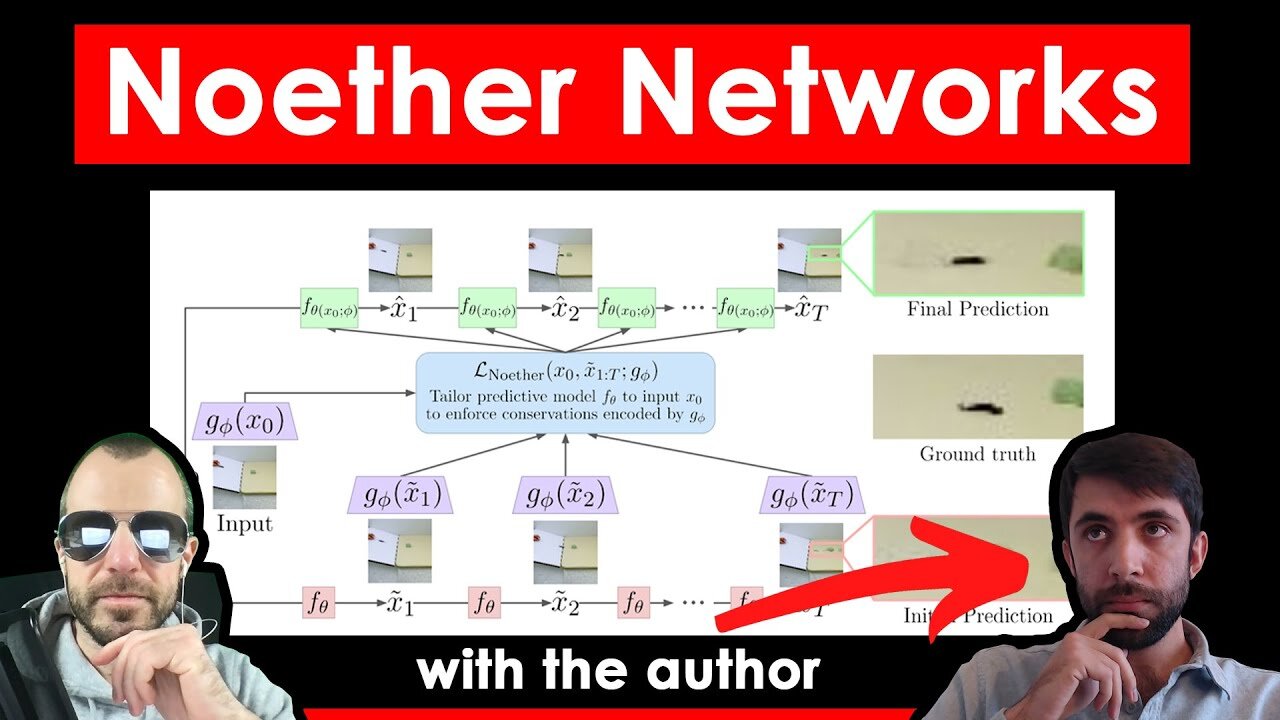Premium Only Content

Noether Networks: Meta-Learning Useful Conserved Quantities (w/ the authors)
#deeplearning #noether #symmetries
This video includes an interview with first author Ferran Alet!
Encoding inductive biases has been a long established methods to provide deep networks with the ability to learn from less data. Especially useful are encodings of symmetry properties of the data, such as the convolution's translation invariance. But such symmetries are often hard to program explicitly, and can only be encoded exactly when done in a direct fashion. Noether Networks use Noether's theorem connecting symmetries to conserved quantities and are able to dynamically and approximately enforce symmetry properties upon deep neural networks.
OUTLINE:
0:00 - Intro & Overview
18:10 - Interview Start
21:20 - Symmetry priors vs conserved quantities
23:25 - Example: Pendulum
27:45 - Noether Network Model Overview
35:35 - Optimizing the Noether Loss
41:00 - Is the computation graph stable?
46:30 - Increasing the inference time computation
48:45 - Why dynamically modify the model?
55:30 - Experimental Results & Discussion
Paper: https://arxiv.org/abs/2112.03321
Website: https://dylandoblar.github.io/noether...
Code: https://github.com/dylandoblar/noethe...
Abstract:
Progress in machine learning (ML) stems from a combination of data availability, computational resources, and an appropriate encoding of inductive biases. Useful biases often exploit symmetries in the prediction problem, such as convolutional networks relying on translation equivariance. Automatically discovering these useful symmetries holds the potential to greatly improve the performance of ML systems, but still remains a challenge. In this work, we focus on sequential prediction problems and take inspiration from Noether's theorem to reduce the problem of finding inductive biases to meta-learning useful conserved quantities. We propose Noether Networks: a new type of architecture where a meta-learned conservation loss is optimized inside the prediction function. We show, theoretically and experimentally, that Noether Networks improve prediction quality, providing a general framework for discovering inductive biases in sequential problems.
Authors: Ferran Alet, Dylan Doblar, Allan Zhou, Joshua Tenenbaum, Kenji Kawaguchi, Chelsea Finn
Links:
TabNine Code Completion (Referral): http://bit.ly/tabnine-yannick
YouTube: https://www.youtube.com/c/yannickilcher
Twitter: https://twitter.com/ykilcher
Discord: https://discord.gg/4H8xxDF
BitChute: https://www.bitchute.com/channel/yann...
LinkedIn: https://www.linkedin.com/in/ykilcher
BiliBili: https://space.bilibili.com/2017636191
If you want to support me, the best thing to do is to share out the content :)
If you want to support me financially (completely optional and voluntary, but a lot of people have asked for this):
SubscribeStar: https://www.subscribestar.com/yannick...
Patreon: https://www.patreon.com/yannickilcher
Bitcoin (BTC): bc1q49lsw3q325tr58ygf8sudx2dqfguclvngvy2cq
Ethereum (ETH): 0x7ad3513E3B8f66799f507Aa7874b1B0eBC7F85e2
Litecoin (LTC): LQW2TRyKYetVC8WjFkhpPhtpbDM4Vw7r9m
Monero (XMR): 4ACL8AGrEo5hAir8A9CeVrW8pEauWvnp1WnSDZxW7tziCDLhZAGsgzhRQABDnFy8yuM9fWJDviJPHKRjV4FWt19CJZN9D4n
-
 LIVE
LIVE
Pickleball Now
3 hours agoLive: IPBL 2025 Day 5 | Final Day of League Stage Set for Explosive Showdowns
103 watching -
 9:03
9:03
MattMorseTV
15 hours ago $8.65 earnedIlhan Omar just got BAD NEWS.
13.5K74 -
 2:02:41
2:02:41
Side Scrollers Podcast
19 hours agoMetroid Prime 4 ROASTED + Roblox BANNED for LGBT Propaganda + The “R-Word” + More | Side Scrollers
92.1K14 -
 16:38
16:38
Nikko Ortiz
14 hours agoVeteran Tactically Acquires Everything…
12.5K1 -
 20:19
20:19
MetatronHistory
2 days agoThe Mystery of Catacombs of Paris REVEALED
7.29K2 -
 21:57
21:57
GritsGG
18 hours agoBO7 Warzone Patch Notes! My Thoughts! (Most Wins in 13,000+)
11.6K -
 2:28:08
2:28:08
PandaSub2000
11 hours agoMyst (Part 1) | MIDNIGHT ADVENTURE CLUB (Edited Replay)
8.02K -
 1:12:43
1:12:43
TruthStream with Joe and Scott
5 days agoJason Van Blerk from Human Garage: Reset your life with Fascial Maneuvers,28 day reset, Healing, Spiritual Journey, Censorship, AI: Live 12/3 #520
17.1K4 -
 24:21
24:21
The Pascal Show
1 day ago $8.98 earned'CHALLENGE ACCEPTED!' TPUSA Breaks Silence On Candace Owens Charlie Kirk Allegations! She Responds!
38.1K28 -
 17:41
17:41
MetatronGaming
2 days agoI should NOT Have taken the elevator...
12.4K2